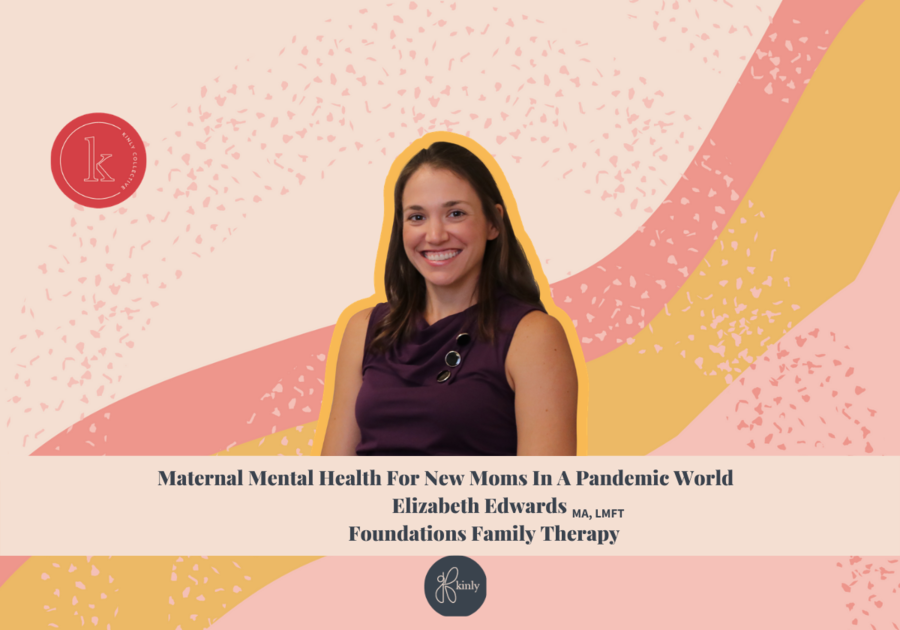This week from the Kinly platform I interview Elizabeth Edwards (LMFT) a licensed therapist trained in perinatal mood disorders and have a passion for working with women in child bearing age.
Sara: OK, Elizabeth, I cannot imagine being pregnant & having a baby during a pandemic, but clearly, millions are! What are you seeing in your practise with new moms & moms to & just moms right now who are coming to you seeking your support in these exceptional times?
Elizabeth: I am finding that first time moms (and their partners) are experiencing more anxiety and isolation than ever before both during pregnancy and through their child's first year of life due to the COVID 19 pandemic.
We are seeing isolation due to CDC guidelines and restrictions that are creating for an extreme lack of support for mothers. Many mothers as well are balancing working from home and parenting one or more children.
These mothers feel "guilt" and uncertainty every day. I am seeing a lot of guilt from mothers who are working and have to send their child to daycare or a family member's house due to COVID risk. Mothers who were already struggling with this decision or did not have a decision in working outside the home are now feeling judged from friends and family members over sending their child to school or daycare. Mothers are really feeling the burden to "do it all" in an even bigger way than before.
Parents are feeling unsupported and isolated due to COVID and trying to avoid family members who are outside of their household. This is causing a lack of physical help in the day to day with new babies and children as well as systemically a lack of support without school. Parents are having to juggle work, parenting, and health all at the same time.
We are seeing really high levels of anxiety across the board from children to the elderly. This is especially true with new mothers. The unknowns of the pandemic lead many new mothers to stay inside, not see family or friends, and have to do all the caretaking alone. This physically leads to burnout and higher rates of stress and depression because we are seeing lack of sleep just because there are not enough hands to help.
There is also a lot of overall grief. Grief that life even looks this way. Grief over deaths of loved ones and funerals that could not happen, grief over loss of traditions and family gatherings, grief that their preschoolers are growing up in a world with masks. Grief all around and they do not have space to grieve.
Sara: I can empathize with a lot of this myself. It is a lot, & I don’t think any of us were prepared for how much our lives would change & for how long. What are some practical things you can share
Elizabeth:
1. Write out a risk/benefit list for a topic you feel conflicted on and compare with people who's opinion you value.
If your parents have not yet met your baby and your child was born in May, it might be time to think about what are the overall risks/benefits to continuing to isolate. How can I keep everyone safe AND allow myself, my child and those I love the connection they need? Talk to those who have something at stake in these decisions and
2. Have something you do for yourself every day. This will give you something to look forward to each day. Something small, a walk by yourself, Netflix, a piece of chocolate, even those things can greatly boost your mood.
3. Develop gratitude and healthy habits to nourish yourself. Start keeping a gratitude journal. Write 3 things that you are grateful for or went well that day on your phone or in a journal. Practicing and noticing gratitude can totally change your mood. Also putting into practice healthy physical habits as well as mental habits such as healthy eating, getting sleep, drinking water, and consistent exercise.
4. Write and focus on things you can control. Draw 2 circles. On the inside circle write things which you can control and the outside circle write everything on your mind that you have no control over. When you find you are worrying about things that you cannot control, shift your thinking to something you can control.
5. Use technology as a way of support. Find Facebook or other support groups for new moms. Engage in online counseling. Use zoom and FaceTime to your advantage to connect as best you can.
Sara: Thank you, those are so practical! If you can leave whoever is reading this with one key takeaway or piece of advice, what would it be?
Most feelings of anxiety and depression are totally normal and expected after childbirth.
Please know that if you have trouble sleeping when you have the opportunity to, feel angry/irritable more than usual, are having thoughts of harming yourself or others, or have excessive ruminating thoughts of harm coming to your child, these are all symptoms of a postpartum mood disorder. If you are in crisis, please call 9-1-1 or go to your local emergency room. If you are experiencing these symptoms, please reach out to a licensed mental health provider. This is common and can be fixed, we just need to know.
If you’re looking for support for your mental & emotional health & this interview resonated with you, you can find Elizabeth on www.kinly.co
Macaroni Kid Knightdale-Wendell-Zebulon is a FREE resource helping you find family-friendly things to do in our area!
Sign up to receive a weekly calendar of events, guides to activities, local information, and much more.
Find Your Family Fun!
 |  |  |



